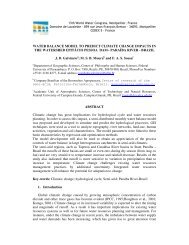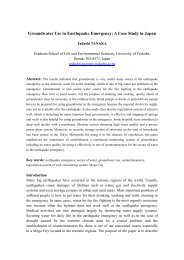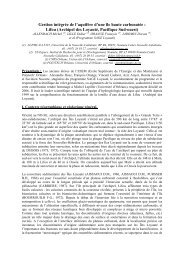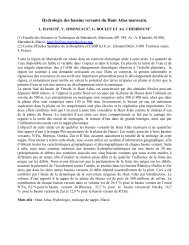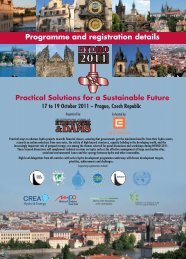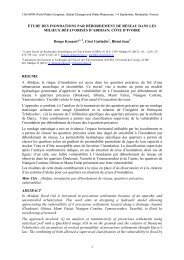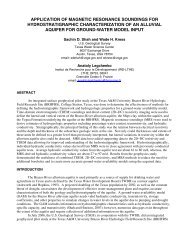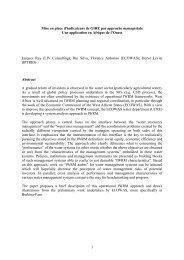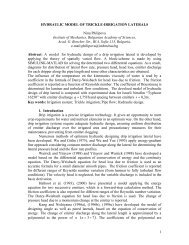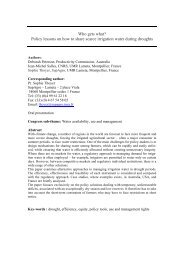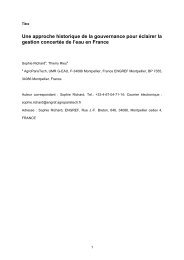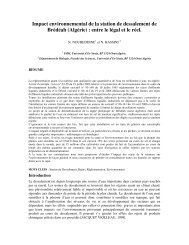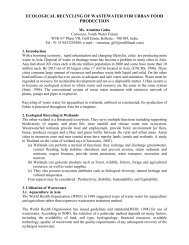Vulnerability of Mediterranean hydrosystems to ... - agire - BRGM
Vulnerability of Mediterranean hydrosystems to ... - agire - BRGM
Vulnerability of Mediterranean hydrosystems to ... - agire - BRGM
- No tags were found...
Create successful ePaper yourself
Turn your PDF publications into a flip-book with our unique Google optimized e-Paper software.
Extended abstractThe <strong>Mediterranean</strong> region, that includes interconnected hydro-systems in which groundwater isimportant, is subjected <strong>to</strong> a contrasted climate and an increasing anthropogenic pressure.Global warming over <strong>Mediterranean</strong> region will probably cause more warm and dry summers and lessprecipitation during warmer winters and shorter rainy seasons. These predictions set out by the lastreport <strong>of</strong> the Intergovernmental Panel on Climate Change (IPCC AR4, 2007) are rather different thanthese released by the previous assessment report (IPCC TAR, 2001), in which more rainfall waspredicted during winter. Those changes are likely <strong>to</strong> have a negative impact on water resourcesthroughout the year and will certainly complicate the current water management strategies mainlyoriented <strong>to</strong> respond <strong>to</strong> the domestic and agricultural water demand.In the Languedoc-Roussillon region for instance, the population growth (on a mean range <strong>of</strong> 1,5% peryear) is likely <strong>to</strong> provoke a substantial increase in demand for water by a rate close <strong>to</strong> 20% in the next15 years, when alternatively, the extent <strong>of</strong> irrigation systems size will be slightly decreasing in thefuture. In addition, environment-protection policies will be enhanced in the future with theimplementation <strong>of</strong> the European Water Framework directive.Within this general framework, the VULCAIN project aims <strong>to</strong> implement <strong>of</strong> an integrated(transdisciplinary) modelling method <strong>to</strong> assess the impact <strong>of</strong> climatic and socio-economic drivingforces on the <strong>Mediterranean</strong> hydro-systems at mean (2020-2040) and longer term (2040-2060).The study zone is the Pyrénées Orientales department, chosen because it contains on the one hand,specific <strong>Mediterranean</strong> hydro-systems (coastal multi-layer aquifer, karstic systems with endogenousand exogenous recharge by rainfall and water losses and three river basins controlled by dams), andon the other hand, a socio-economic context that is close <strong>to</strong> the most critical <strong>of</strong> the Languedoc-Roussillon region in terms <strong>of</strong> water demand and available water resources.This paper presents the first-year results <strong>of</strong> the VULCAIN project. Non stationarity analyses wereperformed on temperature and precipitation data series over 35 years (1970-2005). Results show anincrease <strong>of</strong> mean annual temperatures <strong>of</strong> 1,5° C over the analysed period and a general decrease <strong>of</strong>monthly precipitation for all seasons, excluding autumn where an increase in both the rainfall eventsoccurrence and intensity was found in November. Climate scenarios were built both from thesimulation results <strong>of</strong> five global circulation models (GCM) (involved in the IPCC-AR4 simulationgroups) under the A1B greenhouse gases emission scenario <strong>of</strong> the IPCC. Those scenarios show ageneral increase <strong>of</strong> the mean monthly temperature <strong>of</strong> 1-2°C for 2020-40 and 1.7-3.3°C for 2040-60.Relatively large differences are found between the different GCM results concerning future monthlyprecipitation, but a general decreasing trend is found for all seasons notably for 2040-60.Two main different sorts <strong>of</strong> systems contain the water resources <strong>of</strong> the study area: the Agly, Têt andTech river basins where the water management uses dams and channels essentially for irrigationpurposes <strong>of</strong> around 15 000 ha <strong>of</strong> cultivated area and the plio-quaternary aquifer <strong>of</strong> the Roussillon plainexploited for drinking water purposes (60 Mi m 3 ). Both systems are closely linked by hydraulic devicesand present a notably strong dependence on dam management strategies. A baseline scenario is indevelopment, <strong>to</strong> describe the expected evolution <strong>of</strong> economic activities depending on the waterresources and on socio-economic and political drivers <strong>of</strong> the study area. Predicted climate changescenarios are likely <strong>to</strong> produce a general run<strong>of</strong>f, soil water content, aquifer recharge reduction and <strong>to</strong>complicate the filling <strong>of</strong> the dams. Consequently, the increasing demand in drinking water linked <strong>to</strong> thepopulation growth is likely <strong>to</strong> face important difficulties. The impact <strong>of</strong> the climate scenarios on theagricultural water management is uncertain, as the different driving socio-economic forces mayproduce opposed impacts in this sec<strong>to</strong>r that could result in a reduction <strong>of</strong> water demand.Assuming that climate does not change from present, the baseline scenario will be based on theterri<strong>to</strong>ry expertise (using participa<strong>to</strong>ry pro<strong>to</strong>cols and ac<strong>to</strong>r meetings) and the evolution <strong>of</strong> regionalsocio-economic driving forces. It also will be consistent with assumptions underlying the definition <strong>of</strong>the SRES scenarios at a global level. Together with the climate scenarios, it will be used <strong>to</strong> forcehydrological/hydrogeological models currently in development. Aiming <strong>to</strong> develop integrated <strong>to</strong>ols andmethods <strong>to</strong> the operational assessment <strong>of</strong> the global change impacts, the Vulcain project will permitthe evaluation <strong>of</strong> the future vulnerability <strong>of</strong> the exploited hydro-systems and <strong>of</strong> the supplied terri<strong>to</strong>ry inthe <strong>Mediterranean</strong> context.3



